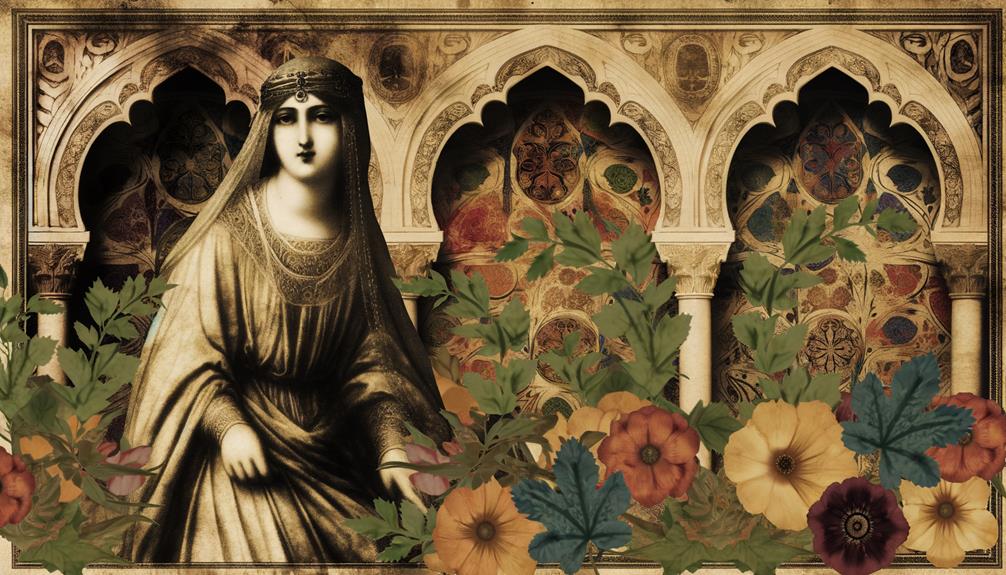Eleanor Name Meaning and Origin
Eleanor is a name with profound historical and linguistic roots. Originating from the Old French name Aliénor, it may have evolved from the Provençal "alia Aenor" or the Germanic "Adenordis," suggesting meanings related to nobility and the north.
The name gained prominence through Eleanor of Aquitaine, a formidable queen in the 12th century. Eleanor symbolizes regality and has seen fluctuating popularity, with significant peaks during the medieval and Victorian eras.
Modern usage reflects a resurgence linked to vintage trends. Variants like Eleanora and nicknames such as Ellie show its adaptability.
The deeper cultural and literary heritage of Eleanor continues to captivate enthusiasts.

Key Takeaways
- Eleanor derives from Old French Aliénor and potentially from Provençal alia Aenor, meaning "the other Aenor."
- The name has Germanic roots, with elements suggesting meanings like "noble" and "north."
- Eleanor's cultural significance spans royalty, literature, politics, and the arts.
- Variations like Eleanora and nicknames like Ellie highlight the name's adaptability across languages.
- Eleanor symbolizes wisdom, resilience, and grace, maintaining popularity through historical and modern times.
Historical Background
Historically, how has the name Eleanor evolved through different cultures and eras, and what significance has it held across various societies?
The name Eleanor first gained prominence in medieval Europe, particularly through Eleanor of Aquitaine, an influential 12th-century queen consort of France and England. As a symbol of nobility and power, Eleanor became synonymous with leadership and grace.
Over time, the name spread across Europe, adapted by various royal families and the aristocracy, reinforcing its association with high status. During the Renaissance and Enlightenment periods, Eleanor maintained its prestige, often appearing in literature and art.
In modern times, the name has endured, continuing to evoke a sense of timeless elegance and cultural heritage, while transcending its aristocratic origins.
Linguistic Roots
The name Eleanor derives from the Old French name Aliénor, which itself is believed to have origins in the Provençal name Aliénor or the Germanic name Adenordis, illustrating a rich tapestry of linguistic influences across medieval Europe. This name has been borne by various notable historical figures, which further adds to its allure and significance. Interestingly, while Eleanor has a storied past, the name Elsie has emerged as a modern favorite, and its charm is often attributed to its simplicity and warmth. In exploring its connections, one might also find that the “elsie name meaning” hints at a form of “pledged to God,” showcasing the diverse interpretations names can hold across different cultures and eras.
The Provençal variant likely evolved from the Latin phrase 'alia Aenor,' meaning 'the other Aenor,' indicating it was used to distinguish between individuals of the same name.
The Germanic roots, Adenordis, suggest a combination of elements meaning 'noble' (adal) and 'north' (nord).
This dual heritage underscores Eleanor's evolution through cultural and linguistic exchanges, reflecting the interconnectedness of European languages and societies.
Such an etymological journey highlights the name's enduring presence and adaptability through centuries of historical transformations.
Popularity Over Time
The name Eleanor has experienced fluctuating levels of popularity over the centuries, characterized by significant peaks during certain historical periods.
Analyzing historical popularity trends reveals its enduring appeal, which has been rejuvenated in contemporary times through modern usage patterns.
Understanding these temporal shifts provides a thorough perspective on the name's lasting resonance and cultural significance.
Historical Popularity Trends
Eleanor's popularity has experienced significant fluctuations over the centuries, reflecting broader cultural and societal shifts. From its medieval roots, the name surged in prominence during the 12th century, spurred by figures such as Eleanor of Aquitaine. The Victorian era saw another resurgence, aligned with a romanticized view of medieval history. However, its usage waned in the early 20th century before experiencing a revival in recent decades.
| Century | Popularity Surge | Key Influences |
|---|---|---|
| 12th Century | High | Eleanor of Aquitaine |
| 19th Century | Moderate | Victorian Romanticism |
| 20th Century | Decline, then Revival | Cultural Renaissance, Nostalgia |
These historical trends underscore the name Eleanor's enduring appeal and its resonance across different eras.
Modern Usage Patterns
Modern usage patterns of the name Eleanor reveal a fascinating trajectory marked by its steady resurgence in recent years, driven by factors such as vintage name trends and cultural nostalgia. The name, once considered old-fashioned, has seen a renaissance, particularly among younger parents seeking timeless yet distinctive choices for their children.
Analyzing data from various sources, several key trends emerge:
- Increased Popularity: Eleanor has consistently climbed the ranks in baby name charts over the past two decades.
- Celebrity Influence: High-profile figures and characters named Eleanor in popular media have contributed to its allure.
- Regional Variations: Notable popularity in European and North American regions.
- Associated Names: A rise in similar names like Ella and Nora complements Eleanor's resurgence.
These patterns underscore Eleanor's enduring appeal.
Famous Eleanors
Several notable figures named Eleanor have made significant contributions to various fields, cementing the name's legacy in history and culture.
Eleanor Roosevelt, the First Lady of the United States from 1933 to 1945, was a formidable advocate for human rights and social justice. Her influence extended well beyond her tenure in the White House, leaving an indelible mark on American and global policies.
Another eminent Eleanor, Eleanor of Aquitaine, was a powerful medieval queen consort of both France and England, renowned for her political acumen and cultural patronage.
In the arts, Eleanor Parker, an acclaimed American actress, garnered multiple award nominations for her compelling performances.
These examples reflect the enduring impact of individuals named Eleanor across various domains.
Cultural Significance
The name Eleanor carries considerable cultural significance, reflecting both historical depth and contemporary relevance through its enduring presence in literature, politics, and the arts. Its multifaceted influence can be observed across various domains, illustrating its lasting charm and adaptability.
- Historical Figures: Eleanor of Aquitaine, a medieval queen, left an indelible mark on European history through her political acumen and patronage of the arts.
- Literature: Eleanor has been immortalized in works of fiction, such as Eleanor Dashwood in Jane Austen's 'Sense and Sensibility,' symbolizing wisdom and steadfastness.
- Politics: Eleanor Roosevelt, former First Lady of the United States, is celebrated for her humanitarian efforts and advocacy for civil rights.
- Modern Media: Characters named Eleanor continue to appear in contemporary films and television, maintaining the name's cultural resonance.
Variations and Nicknames
In examining the variations and nicknames of the name Eleanor, one finds a rich tapestry of linguistic evolutions and cultural adaptations that reflect its widespread and enduring appeal.
Variations such as Eleanora, Elinor, and Leonor illustrate the name's adaptability across different languages and cultures. Derived from the Old French form of the Provençal name Aliénor, these variants preserve the name's historical essence while offering regional uniqueness.
Nicknames like Ellie, Nora, and Nell provide affectionate, informal alternatives, appealing to different age groups and personal preferences. Each variant and nickname retains the core elegance of Eleanor, showcasing its versatility and timeless charm.
This adaptability has enabled the name to maintain its popularity and relevance across generations.
Modern Usage
Building on the name's adaptability and cultural resonance, modern usage of Eleanor reflects both a continuation of its historical elegance and a contemporary resurgence in popularity. This name appeals to parents seeking a classic yet timeless choice, harmonizing tradition with modernity.
The sustained appeal of Eleanor can be attributed to several factors:
- Celebrity Influence: Notable figures named Eleanor have elevated its profile.
- Versatility: The name lends itself to various nicknames and diminutives, enhancing its adaptability.
- Cultural Significance: Its rich historical roots contribute to a sense of enduring legacy.
- Popularity Trends: Recent years have seen a notable increase in its use, as reflected in baby name statistics.
These elements collectively underscore Eleanor's enduring charm and relevance in today's naming landscape.
Eleanor in Literature
The name Eleanor has been immortalized in literature through various prominent characters, such as Eleanor Dashwood in Jane Austen's 'Sense and Sensibility,' who embodies the virtues of sensibility and restraint.
Additionally, historical literary references to Eleanor often reflect themes of nobility and strength, drawing inspiration from figures like Eleanor of Aquitaine. This recurring presence underscores the name's enduring appeal and its association with complex, influential women in literary history.
Prominent Literary Characters
Literary landscapes often feature characters named Eleanor, whose complex narratives and distinctive personalities leave a lasting impression on readers. These characters frequently embody diverse attributes ranging from resilience to introspection, making their stories compelling and memorable.
Eleanor Dashwood, in Jane Austen's 'Sense and Sensibility,' exemplifies rationality and emotional restraint amid familial turmoil.
Eleanor Vance, in Shirley Jackson's 'The Haunting of Hill House,' navigates psychological complexities within a haunted setting.
Eleanor Oliphant, in Gail Honeyman's 'Eleanor Oliphant Is Completely Fine,' portrays her journey through loneliness and social awkwardness towards self-discovery.
Eleanor Roosevelt, though a historical figure, appears as a character in numerous biographical novels, reflecting her influential legacy.
These Eleanors enrich literature with their multifaceted roles and enduring impact.
Historical Literary References
Exploring historical literary references reveals that characters named Eleanor have long been woven into the fabric of storytelling, embodying varied themes and societal reflections across different time periods. From the medieval romance to contemporary novels, Eleanors have often been portrayed as strong, complex figures. For example, Eleanor Dashwood in Jane Austen's "Sense and Sensibility" personifies rationality and restraint, reflecting the virtues prized in Austen's era. In contrast, Eleanor Vance in Shirley Jackson's "The Haunting of Hill House" explores themes of isolation and psychological depth.
| Work | Character |
|---|---|
| "Sense and Sensibility" | Eleanor Dashwood |
| "The Haunting of Hill House" | Eleanor Vance |
| "The Waste Land" | Madame Sosostris (Eleanor) |
| "Eleanor & Park" | Eleanor Douglas |
These characters illustrate the diverse narrative roles that Eleanors have played throughout literary history.
Name Characteristics
Eleanor, a name with a rich historical background, exudes an air of elegance and timeless sophistication. Its allure lies not only in its phonetic grace but also in its versatility and depth.
The name Eleanor is characterized by several distinctive attributes:
- Regality: Often associated with royalty and nobility, Eleanor carries a majestic presence.
- Literary Resonance: Its frequent appearances in classic literature imbue it with a scholarly charm.
- Enduring Popularity: Eleanor has maintained its relevance across centuries, appealing to various generations.
- Cultural Versatility: The name transcends cultural boundaries, being embraced in numerous countries and languages.
These characteristics collectively render Eleanor a name that is both historically rich and contemporarily appealing, making it a perennial favorite.
Conclusion
In summation, the name Eleanor, with its rich historical tapestry and diverse linguistic roots, has woven itself into the cultural fabric across centuries.
Its enduring popularity, celebrated through notable figures and literary works, underscores its timeless allure.
The name's variations and nicknames further enrich its appeal, making it a versatile choice in contemporary times.
Like a well-worn book, Eleanor continues to captivate and resonate, embodying a blend of elegance and strength that transcends eras.






